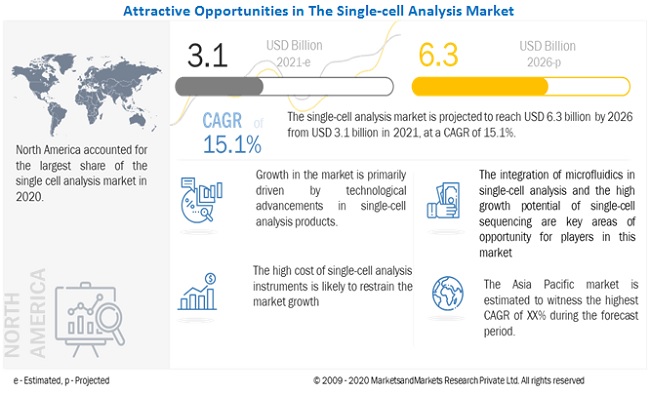The Research Report on “Single-cell Analysis Market by Cell Type (Human, Animal, Microbial), Product (Consumables, Instrument), Technique (Flow Cytometry, NGS, PCR, Microscopy, MS), Application (Research, Medical), End User (Pharma, Biotech, Hospitals) – Global Forecast to 2026″ published by MarketsandMarkets™, is projected to reach USD 6.3 billion by 2026 from USD 3.1 billion in 2021, at a CAGR of 15.1% during the forecast period.
Growth Driver: Growing prevalence of cancer;
One of the most important application areas of single-cell analysis is cancer genomics. According to GLOBOCAN, the number of cancer cases will rise to approximately 30 million by 2040 from 19.3 million cases and 10 million cancer deaths in 2020. The growth in the prevalence of this disease has resulted in a need to conduct extensive research for diagnosis and treatment; single-cell analysis forms an important part of this research. The analysis of individual cells enables the correct diagnosis of diseases and monitoring of treatment efficacy. Single-cell analysis aids in the enumeration of helper T-cells, determination of DNA content, and monitoring the proliferation of tumor cells in breast cancer and other malignancies.
Download PDF Brochure:
https://www.marketsandmarkets.com/pdfdownloadNew.asp?id=171955254
Industry Segmentation In Detailed:
The consumables segment dominated the single cell analysis market in 2022
Based on products, segmented into consumables and instruments. Consumables accounted for the largest share of 67.4% of the single-cell analysis market in 2020. The large share of this segment can primarily be attributed to the frequent purchase of these products compared to instruments, which are considered a one-time investment. The wide applications of consumables in research and genetic exploration, exosome analysis, and isolation of RNA and DNA are also expected to drive market growth.
The academic & research laboratories segment accounted for the largest share in 2020
Based on end users, the single-cell analysis market is segmented into academic & research laboratories, biotechnology & pharmaceutical companies, hospitals & diagnostic laboratories, and cell banks & IVF centers. In 2020, the academic & research laboratories segment accounted for the largest share of the single-cell analysis market. Factors such as growth in funding for life science research and the increasing number of medical colleges and universities are driving the growth of this end-user segment.
Request Sample Pages: https://www.marketsandmarkets.com/requestsampleNew.asp?id=171955254
Leading Key Players and Analysis:
The prominent players in the single-cell analysis market are Becton, Dickinson and Company (US), Danaher Corporation (US), Merck KGAA (Germany), QIAGEN N.V. (Netherlands), Thermo Fisher Scientific, Inc. (US), Promega Corporation (US), Illumina, Inc. (US), Fluidigm Corporation (US), 10X Genomics (US), and Corning Incorporated (US).
Becton, Dickinson and Company (BD) is a global medical technology company engaged in the development, manufacture, and sale of a wide range of devices, medical supplies, diagnostic products, and laboratory equipment. The company’s products are used by healthcare institutions, life science companies, clinical laboratories, and the pharmaceutical industry. BD has three major business segments, namely, BD Medical, BD Life Sciences, and BD Interventional. The BD Life Sciences segment is further categorized as Preanalytical Systems, Diagnostic Systems, and Biosciences. The company provides single-cell analysis products through the Biosciences segment.
Geographical Analysis in Detailed:
North America accounted for the largest share of 44.9% of the global single-cell analysis market in 2020. This market is expected to reach USD 2,520.2 million by 2026 from an estimated USD 1,282.2 million in 2021, at a CAGR of 14.5%. North America’s prominence in this market is mainly attributed to the presence of key market players, coupled with increasing R&D expenditure and federal funding.
Speak to Analyst: https://www.marketsandmarkets.com/speaktoanalystNew.asp?id=171955254


